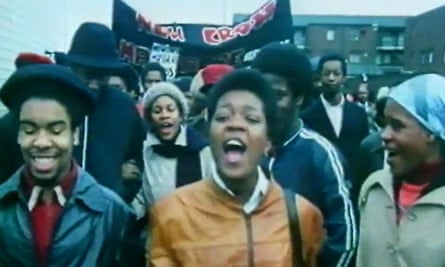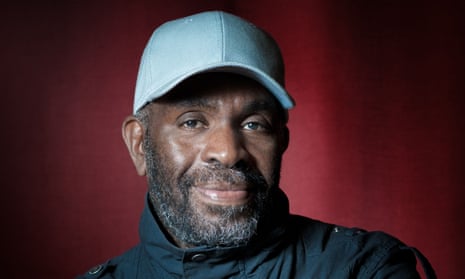The groundbreaking film director and activist Menelik Shabazz, who has died aged 67 of diabetes-related complications, produced a compelling body of work depicting the lives of black Britons, underlining their struggles with pervasive racism, and countering the often reductive narratives of the mainstream media.
He began his career with unsparing television documentaries such as Breaking Point: The “Sus Law” Controversy (ITV, 1978), which helped in the campaign to repeal the police stop and search policy.
He will always be most strongly associated, however, with Burning an Illusion (1981), his debut feature, which he wrote and directed, a nuanced portrait of a young black woman’s personal and political awakening after societal pressures affect her feckless boyfriend. For its tackling of unprecedented subject matter, Burning an Illusion was awarded the grand prix at the Amiens international film festival; and Cassie McFarlane’s naturalistic portrayal of its protagonist, Pat, won her the Evening Standard award for most promising new actress.
Shabazz subsequently nurtured other aspiring black film-makers through the Channel 4-aligned Ceddo collective. He launched Black Filmmaker Magazine in 1997 to address industry concerns from a black perspective and established an affiliated film festival.
He recommenced his directing career with The Story of Lover’s Rock (2011), a sympathetic “fusion documentary” celebrating the distinctive black British reggae subgenre, which won the jury prize for best documentary at the Trinidad international film festival.
Born Thomas Braithwaite in Barbados, he spent his formative years in a village in the rural St Thomas parish, where his mother worked in the local sugarcane fields and kept food on the table by cultivating her own plot, keeping a cow and chickens to produce milk and eggs. His father, who trained as a carpenter, left Barbados when Thomas and his younger sister were still infants and, after undertaking agricultural work in the US, settled in Finsbury Park, north London. The rest of the family joined him in 1961, living together in one room until they managed to acquire a house of their own in 1966.

At Tollington Park secondary school, Thomas was cricket captain and excelled at tennis, but was among the black students singled out for corporal punishment in an atmosphere of racial tension. Being one A-level short quashed his plans to study design at art school, but while he was at North London College, he realised that Sony’s Portapak video recorder put film-making potentially within his reach.
Reading Malcolm X’s book On Afro-American History prompted his shift from Thomas Braithwaite to Menelik Shabazz. The forename came from the Ethiopian emperor Menelik II, who repelled Italian invaders at the battle of Adwa in 1896, and Shabazz was the surname Malcolm X adopted following his departure from the Nation of Islam.
Moving to a squat in West Hampstead and influenced by the Black Panther movement, Shabazz joined the Black Liberation Front and was soon editing their journal, Grass Roots; attending the set of Horace Ové’s landmark film Pressure furthered his wish to direct. With photographs provided by Ové that he passed off as his own, Shabazz enrolled on a master’s course at the London Film School but was forced to quit after six months, when refused a local authority grant.
He had befriended David Kinoshi at LFS, and they collaborated on the short documentary Step Forward Youth (1977), challenging biased portrayals of young black Britons. The film was funded by Kinoshi’s uncle and the journalist Mike Phillips, and its screening at the African Festival of Arts and Culture (FESTAC) in Lagos allowed Shabazz to make his first pilgrimage to Africa.
Shabazz made Blood Ah Go Run (1981) to document the apathetic state response to the New Cross fire that January, which had resulted in the deaths of 13 young black people at a house party in south-east London. After the success of Burning an Illusion he conceived several other feature films, only to find his proposals continually rejected.
The frustration led to the founding of Ceddo in 1982, with Shabazz shifting to producer on films such as The People’s Account (1986), an oral history of the Broadwater Farm disturbances in Tottenham in 1985, which was blocked from broadcast on Channel 4 by the Independent Broadcasting Authority, due to participants’ allegations of police racism and protestors’ claims of having acted in self-defence.
During his time with Ceddo, Shabazz also directed the cutting-edge Time and Judgment (1988) for Channel 4, depicting aspects of the black experience through an unusual mix of archive footage, staged vignettes, afrocentric science fiction, and poetic utterances.
After making the docudrama Catch a Fire (1996) for the BBC’s Hidden Empire series, about the Jamaican preacher Paul Bogle and the Morant Bay rebellion of 1865, Shabazz concentrated on Black Filmmaker Magazine, holding its annual awards events and affiliated screenings at the ICA until 2011.
He returned to Nigeria in 2007 to scout investors for the burgeoning Nollywood industry and was inspired to begin directing again after seeing what local film-makers were achieving with small budgets and technically limited equipment; after The Story of Lover’s Rock, Shabazz directed Looking for Love (2015), querying the love lives of black singletons in the internet age.
Perpetually uncompromising and individual, Shabazz developed the postcolonial soap opera Heat in Barbados in 2017 for the cable channel Flow TV, but the series was scrapped when it was taken over by a US cable group.
He then directed the docudrama Pharaohs Unveiled (2019), using the psychic channelling of the medium Neferatiti Ife to challenge accepted accounts of ancient Egyptian history. He subsequently relocated to Harare to begin filming The Spirits Return: Ancient Zimbabwe, about a black British woman who travels to Africa to reconnect with her roots.
He is survived by several children and stepchildren.

Comments (…)
Sign in or create your Guardian account to join the discussion